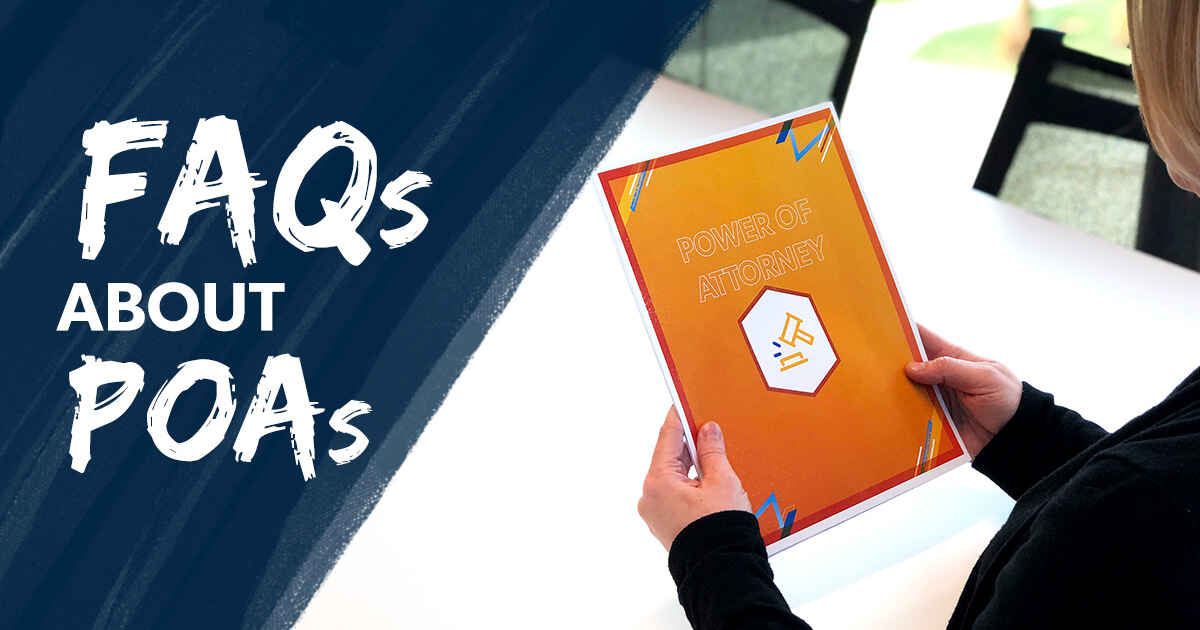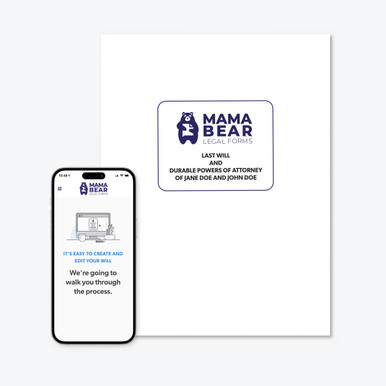What Is a Power of Attorney (POA)?
12 Min Read | Jul 24, 2024

You don’t have to graduate from law school to get a power of attorney (POA). And even though it is an important document that’s part of a legal will, you can often make a POA without even hiring an attorney!
A POA is just a document you use to give someone the authority to make certain choices for you when you can’t speak for yourself. When you make a POA, you get to choose what those decisions are and who can make them for you. (Feeling powerful yet?)
So, what kinds of decisions are we talking about here? And who should you pick to handle that kind of thing? Let’s get the answers.
What Is a Power of Attorney (POA)?
A power of attorney (POA) is a legal document you use to name an agent (aka attorney-in-fact) to make important choices for you when you can’t make them yourself. We’ll talk more about how to pick your agent later, but here it is in a nutshell—when you appoint one, you’re giving them the legal right to handle decisions that you’ve approved them to make. Trust is key.
Save 10% on your will with the RAMSEY10 promo code.
Without a power of attorney, you could wind up in a critical financial or medical situation—like being stuck overseas or in a coma—where you’re unable to take certain actions or make decisions that’ll affect your (and your family’s) future. Touchy subject? You bet it is. But which would you rather do: Get this stuff buttoned up today with a safe and legal plan? Or leave it up to fate and possibly end up at the mercy of a court of law on some unknown future date? We knew you’d see the power of a POA!
Having a POA in place is the only way to legally guarantee that someone who has your best interests in mind will have the power to speak for you when you need it most.
How Does a Power of Attorney (POA) Work?
A POA protects your life and your stuff from third parties (like courts or government agencies) by letting you name an agent who can speak for you if you ever can’t. Wondering if you even need a POA? The answer is yes!
Everyone needs this kind of legal coverage because freak accidents can happen at any time. That’s why you and your family need a trusted ally who can take action on your behalf. You might also need a POA for less serious reasons where your POA acts more as a convenient legal tool. Let’s look at a couple of examples.
Meet Bryan. He’s young and single, and he’s making pretty good money. So, he probably doesn’t need to worry about somehow losing the power to make big life decisions for himself, right? Wrong. Because Bryan travels for work—a lot. One day, he’s overseas on a business trip. Between meetings, a friend texts him about an amazing, one-day-only opportunity back home—investing in a tiny-house community. Bryan wants in! (Who wouldn’t?) But he can’t authorize the deal by Skype. His friend back in the states would need to be Bryan’s POA to make the deal happen for him.
Now take Lauren. She’s also relatively young and healthy, but she’s scheduled to have a minor outpatient surgery soon. It’s unlikely, but if something goes wrong during her procedure, Lauren could temporarily lose the ability to speak or act for herself. Having a POA would assure Lauren that she’d have a trusted agent to speak and act on her behalf . . .
Bottom line: A POA is a sensible and easy way to make sure someone who has your back also has the legal power to get things done for you—from auction houses to operating rooms and beyond.
Will an online will work for you?
Find out if an online will works for you in less than 5 minutes.
What Are the Limits of a Power of Attorney (POA)?
As powerful as a POA is, it definitely has limits. To be legal, all the following has to be true:
- The POA is written and signed in compliance with the laws in your state. Most states require witnesses or notarization for a binding signature. So, find out your state’s requirements before putting pen to POA . . . err, paper!
- When you sign your POA, you have to be of sound mind for the doc to be valid in a court of law.
- As the principal (legal talk for the person who creates a POA), you’re in complete control of which powers you want your attorney-in-fact to have. In other words, appointing someone to act on your behalf in a POA is not a blank check for them to do anything they want in your name and with your resources. We’ll talk more later about some of the most common forms and uses of a POA, but just know—it’s up to you to define the limits of your own document.
In addition to the general limits of your POA, there are rules about who can serve as your attorney-in-fact. Whoever you choose must:
- Be a mentally competent adult
- Read and understand your living will
- Understand your financial goals (for financial POA)
- Understand your medical wishes (for health care POA)
- Not be your health care provider (for health care POA)
Great as those rules are, they’re no substitute for the most important factor in choosing your attorney-in-fact: trust. (We’ve got a whole discussion below about how to pick an awesome agent.) No matter who you choose, it has to be someone you know has your best interests at heart.
Interested in learning more about estate planning?
Sign up to receive helpful guidance and tools.
Different Types of POAs
The basics of what a POA can do for you are pretty simple, but there are a few different types you should know about:
- General power of attorney (GPOA)
- Durable power of attorney (DPOA)
- Health care power of attorney (HCPOA)
- Financial power of attorney (FPOA)
To be sure you choose the right document for yourself, here’s the breakdown of each type.
General Power of Attorney (GPOA)
With this form of POA, your agent’s ability to do things for you is pretty broad. In fact, the GPOA goes into effect as soon as it’s created, which means it applies even while you can act for yourself. GPOA agent powers include:
- Hiring professional help for you
- Handling your business deals
- Operating your business
- Buying insurance for you
- Paying your bills
- Signing documents on your behalf
And that’s just a few of the ways an agent can help you in a general POA. This form of POA might come in handy if you want help with financial things and you know someone with a lot of experience in that area who you really trust.
But a general POA isn’t the kind we recommend for most situations. That’s because most people would rather keep most life decisions in their own hands until they’re truly unable to make them—like if they’re out of town or lose the ability to communicate (for whatever reason).
Also, a general POA isn’t usually durable unless you specifically make it that way. If a POA isn’t durable, that means it’ll stop working if you become incapacitated. And for most people, the whole point of this POA thing is to give someone you trust the power to help you when you’re out of commission!
Durable Power of Attorney (DPOA)
The great thing about making your POA durable is that it remains in effect at the most critical moments—those times when, through illness or injury, you lose the physical or mental ability to make decisions for yourself (aka you’re incapacitated). Let’s look at two ways you can make a durable POA:
- Make your POA durable as soon as you sign it: In this scenario, your agent has powers similar to those in a general POA, with this key difference—they’ll remain your legal agent even after you’re incapacitated. When you make a POA durable from the moment you sign it, you’re saying you trust your agent not only to help with ongoing decisions while you’re up and at ’em, but also if you lose the power to communicate your wishes in the future. Two different kinds of trust, both pretty crucial. Be sure both you and your agent understand the details and differences between the two scenarios before making a durable POA that goes into effect immediately.
- Make it a springing POA: With this format, the power of attorney allows your agent to act for you when, and only when, you become incapacitated. (That’s when it springs into effect!) In this case, the most important detail to spell out in the POA is what you want the standard to be for deciding if you’re incapacitated. Most POAs either require a doctor to certify you as mentally incompetent, name a specific doctor to do so, or require any two licensed doctors to agree that you’re incapacitated.
Any POA you have should be durable. The best thing about a durable POA is that if you ever do become incapacitated, your family can avoid a legal fight for the right to make the best decisions for your—and their—future. After all, fighting a health battle is hard enough without the additional worry of legal issues.
Health Care Power of Attorney (HCPOA)
Speaking of health battles, a health care POA (or medical power of attorney) gives your chosen agent the ability to make certain medical decisions on your behalf. If you have one, it only becomes effective when you:
- Lose the power to express yourself, either through disease or dementia
- Suffer complications under anesthesia for medical treatment
- Fall into a coma after a brain injury or stroke
- Have a lapse of mental health that leaves you mentally incompetent
Thankfully, those are unusual circumstances—but they do happen often enough to make planning for them necessary and wise. Only a doctor can legally decide when a medical POA applies.
A medical POA can also work together with a separate, related document: a living will. But the two can also be in conflict at times. If you already have a living will, just be sure your HCPOA agent is aware of what’s in it and that it’s updated regularly to reflect your most recent wishes.
Financial Power of Attorney (FPOA)
Just as a health care POA only allows your agent to make medical choices for you, a financial POA only lets them make money decisions for you.
In the example of Bryan’s business trip from earlier, he missed out on a business deal because he was out of town—and without a POA. An FPOA would’ve been a great solution to his problem. If your work has you traveling a lot but you also have local real estate or business ventures that rely on your legal approval to get done, a financial POA is essential.
Another similarity an FPOA has with its medical twin is the way it protects you and your family from a preventable legal battle. In this case, an FPOA lets your agent make crucial decisions about what should happen to your money if you’re unavailable.
Should You Have More Than One Agent?
Now, you might be wondering if you should have more than one POA agent. The short answer is yes. But don’t just scribble down the names of your two most trusted friends on your POA document. Before choosing two attorneys-in-fact, you need to be crystal clear in the document—and with both your agents—about who’ll be your primary agent and who’ll be your alternate agent from the get-go.
There’s a good reason for having more than one agent—if your primary agent isn’t available in an emergency, your alternate agent can act for you. So far, so good!
But don’t forget to spell out who’s primary and who’s secondary, or else legal issues could crop up. And that might foul up the whole plan! What if both agents seem to have equal say but they disagree at a critical moment about how to manage your stuff? You can easily head this off by clarifying it in the POA.
Maybe you’re thinking, But my Aunt Jody and Aunt Loretta are both super smart ladies, and I don’t want to offend either of them. What should I do? Here’s what we recommend for keeping the peace: If you know of two worthy people who both want the slot, let one of them be the alternate. Let’s say, Aunt Jody. She might not like coming second place in the Aunt Agent Sweepstakes, but at least she can take over if something happens to Loretta.
How to Pick Your Power of Attorney (POA) Agent
This is actually really easy. The only person you want making super important choices about your medical or financial well-being is someone you know really well—who also knows you really well. Here are some obvious candidates for an agent in a POA:
- Your spouse
- A sibling
- An adult child
- A coworker or colleague with a lot of wisdom
As you think about who’d serve you well as an agent, it’s also worth mentioning the Uniform Power of Attorney Act (UPOAA), a federal law passed in 2006. Since then, it’s been enacted by 31 states.1 What’s the deal with this law?
The UPOAA has several purposes, but the main goal is to make sure that when POA documents appoint agents, those agents are actually acting in the principal’s—the person who created the POA—best interests. (The duty to take great care of another person’s estate is sometimes called fiduciary duty, and it includes actions taken as the power of attorney.)
The UPOAA allows state courts to review what an agent does for their principal. They can even remove an agent who’s mismanaging the principal’s money, property or health. (Sometimes agents do this for personal gain—this kind of scam is called self-dealing.)
How to Get a Power of Attorney (POA)
This is something we all need to take care of sooner rather than later. Whether you believe you might be incapacitated soon or you’re healthy as a horse—you need a POA. Having a POA in place that names a trusted agent can save your family from all sorts of headaches and heartaches if the unthinkable happens to you.
Creating a power of attorney as part of your will is easy with RamseyTrusted provider Mama Bear Legal Forms. It’s a smart and a great way to build your peace of mind.





